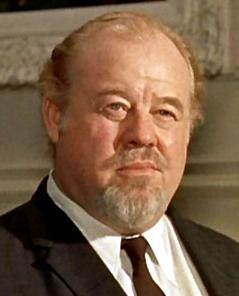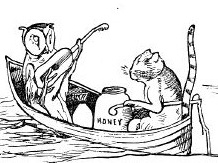
Burl Icle Ivanhoe Ives was an American singer, musician, actor, and author.

"Lavender's Blue" is an English folk song and nursery rhyme dating to the 17th century. It has a Roud Folk Song Index number of 3483. It has been recorded in various forms since the 20th century and some pop versions have been hits in the US and UK charts.
Walt Disney Records is an American record label of the Disney Music Group. The label releases soundtrack albums from Disney's motion pictures, television series, theme parks, and traditional studio albums produced by its roster of pop, teen pop, and country artists.

Adventureland is one of the "themed lands" at the many Disneyland-style theme parks run by the Walt Disney Company around the world. It is themed to resemble the remote jungles in Africa, Asia, South America, the South Pacific and the Caribbean. "To create a land that would make this dream reality", said Walt Disney, "We pictured ourselves far from civilization, in the remote jungles of Asia and Africa."
Salvador "Tutti" Camarata was an American composer, arranger, trumpeter, and record producer. Also known as "Toots" Camarata.

"The Owl and the Pussy-cat" is a nonsense poem by Edward Lear, first published during 1871 as part of his book Nonsense Songs, Stories, Botany, and Alphabets. Lear wrote the poem for a three-year-old girl, Janet Symonds, the daughter of Lear's friend poet John Addington Symonds and his wife Catherine Symonds. The term "runcible", used for the phrase "runcible spoon", was invented for the poem.
"Jimmy Crack Corn" or "Blue Tail Fly" is an American song which first became popular during the rise of blackface minstrelsy in the 1840s through performances by the Virginia Minstrels. It regained currency as a folk song in the 1940s at the beginning of the American folk music revival and has since become a popular children's song. Over the years, several variants have appeared.
"Zip-a-Dee-Doo-Dah" is a song composed by Allie Wrubel with lyrics by Ray Gilbert for the Disney 1946 live action and animated movie Song of the South, sung by James Baskett. For "Zip-a-Dee-Doo-Dah", the film won the Academy Award for Best Original Song and was the second in a long line of Disney songs to win this award, after "When You Wish upon a Star" from Pinocchio (1940). In 2004, it finished at number 47 in AFI's 100 Years...100 Songs, a survey of top tunes in American cinema.
Robie Lester was an American voice artist, singer, actress and author, best known as the voice of "Miss Jessica" in the Rankin/Bass animated special Santa Claus is Comin' to Town, the singing voice of Eva Gabor in Disney's The Aristocats and The Rescuers and as the original "Disneyland Story Reader" for Walt Disney Records read-alongs.
"I Know My Love" is a traditional Irish folk song, which was first collected by Herbert Hughes and published by Boosey & Hawkes in 1909, in Volume 1 of "Irish Country Songs" - although the song is likely to be considerably older than that. The book can be viewed or downloaded as a PDF here.

Scouting Along with Burl Ives is a 1964 album, subtitled The Official Boy Scout Album. Ives was commissioned by the Boy Scouts of America to make this album, which is now available on CD at ScoutStuff.org. Ives is accompanied by a choir of boys and an orchestra directed by Sid Bass. Greg Adams of Allmusic writes, "Scouting Along With Burl Ives is essentially a work-for-hire children's album made for the Boy Scouts and is therefore of limited appeal, but the professionalism and enthusiasm Ives and Bass exhibit are admirable." The album features folk and other songs that might be sung around a campfire. The album is unique in that it also provided a short bio of Ives and his early affiliation with professional football.
"The Riddle Song", also known as "I Gave My Love a Cherry", is an English folk song, a lullaby carried over by settlers to the American Appalachians.
"Sweet Betsy from Pike" is an American ballad about the trials of a pioneer named Betsy and her lover Ike who migrate from Pike County to California. This Gold Rush-era song, with lyrics written by John A. Stone before 1858, was collected and published in Carl Sandburg's 1927 American Songbag. It was recorded by Burl Ives on February 11, 1941 for his debut album Okeh Presents the Wayfaring Stranger. The melody is to the tune of the Irish song "Master McGrath," which made its way to America after the Great Famine of Ireland. It is also that of the ballad "Villikins and his Dinah". Members of the Western Writers of America chose it as one of the Top 100 Western songs of all time.

Burl Ives Presents America's Musical Heritage, released in 1963 by the Longines Symphonette Recording Society, is a six-album box set by folk singer Burl Ives. It is subtitled 114 Best Loved Songs & Ballads for Listening, Singing, and Reading and includes a 168-page book, titled The Burl Ives Sing-Along Song Book, which presents the lyrics for all of the songs and historical background about some of the songs.

Burl Ives and the Korean Orphan Choir Sing of Faith and Joy is an album by the American folk singer Burl Ives. Released on the Herald label in 1963, this is a collection of gospel hymns, most having verses and a chorus. The album also features the World Vision Korean Orphan Choir.

Bill Lee was an American playback singer who provided a voice or singing voice in many films, for actors in musicals and for many Disney characters.

Burl Ives Sings Little White Duck and Other Children’s Favorites is a 12-inch LP album of folk songs for children recorded by Burl Ives for Columbia Records between 1949 and 1951. The label, in 1950, crafted a "shared" 10-inch children's LP. On side one, Hollywood actor Victor Jory narrated Tubby the Tuba, while side two featured Burl Ives performing seven tunes under the title Animal Fair: Songs for Children. The catalog number was JL 8103. One year earlier, Animal Fair: Songs for Children had been presented separately on a two-disc 78-rpm set, using as a catalog number MJV 59. In 1956, another Ives endeavor for children appeared, containing "The Little White Duck" and six other ditties. Part of Columbia's brief (1955–56) House Party Series of 10-inch LPs, the album was called Children's Favorites, affixed with the catalog number CL 2570. Next, a new collection, expanded to 12 inches, combining these 14 Ives selections and 2 additional ones and entitled Burl Ives Sings Songs for All Ages, was issued by Columbia in 1957, bearing CL 980 as the catalog number. Two years later, this album was shortened by two tracks, christened with its final title, Burl Ives Sings Little White Duck and Other Children's Favorites, and reassigned to Columbia's budget label, Harmony Records, which employed HL 9507 as the catalog number. Being the customary practice in the vinyl marketplace of the 60s, this monaural platter wound up electronically enhanced for stereo, circa 1963, and given the modified catalog number HS 14507. Columbia, in 1974, reissued the LP, again in simulated stereo, with the catalog number C 33183. At the same time, the label also transferred the album to cassette tape, affixing the catalog number CT 33183. On November 22, 1988, Columbia unveiled the album in CD format, which upgraded the sound quality to digital stereo. Distribution of the disc then was taken over by Sony Wonder on October 3, 1995. The 1974 LP cover, later retained for the CD, was designed by Ed Lee and Eloise Smith, with illustrations by Reynolds Ruffin. Currently, the CD is out of print, but it still can be purchased through online music sellers. Moreover, all the album tracks are now available via MP3 downloading.

The Music of Disney: A Legacy In Song is a 1992 three disc set of Disney songs spanning eight decades that were originally recorded from 1928 to 1991.

Chim Chim Cheree and Other Children's Choices is a children's album by Burl Ives backed by Disneyland's Children's Chorus. It was released in 1964 by Disneyland Records. The album was recorded at Sunset Sound Recorders in Hollywood. Salvado "Tutti" Camarata, the musical director at Disneyland Records, was the album's producer. The audio engineers were Bruce Botnick, known for his later work with The Doors, and Brian Ross-Myring.











